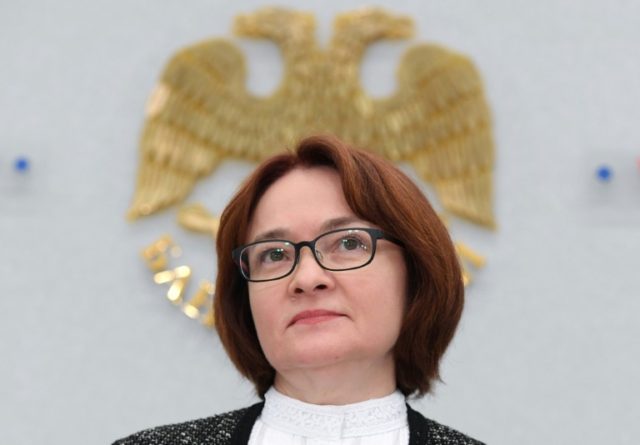Moscow (AFP) – Russia’s central bank on Tuesday sought to reassure the public after new US sanctions prompted a market collapse and plunge in the ruble’s value, insisting there was no threat to financial stability and that the bank was ready to act if necessary.
Russian central bank chief Elvira Nabiullina said at a conference in Moscow that the country’s economy could withstand the latest US sanctions, even as the ruble continued a spectacular plunge against the dollar and the euro.
The ruble’s fall came after the US announced fresh sanctions against Russia on Friday over the diplomatic crisis sparked by the poisoning of former spy Sergei Skripal.
The sanctions hit wealthy businessmen close to President Vladimir Putin and the companies they control, causing them losses of billions of dollars.
The US move prompted the ruble to fall on Monday and on Tuesday it fell to lows against the euro and US dollar not seen since 2016.
The euro exceeded 78 rubles for the first time since April 2016 and the dollar went over 63 rubles for the first time since December 2016 on the Moscow foreign exchange market on Tuesday.
“The central bank has a broad spectrum of instruments in order to act in such situations, if risks arise to financial stability. In our view, there are not such risks now,” Nabiullina said.
“There is no need to take some kind of systemic measures. Of course we will follow the situation and possibly introduce some revisions if necessary,” she said.
Economy minister Maxim Oreshkin also said that “the macroeconomy and the financial markets will survive, there’s no doubt about that.”
“There is volatility and that’s OK,” he said.
Russia’s economy at the end of 2016 emerged from two years of recession caused by Western sanctions imposed over its actions in Ukraine and by falling oil prices, with the country dependent on hydrocarbon revenues.
The new US sanctions were announced to punish Russia for alleged attempts to subvert Western democracies. They focus on 24 individuals and their companies and ban them from doing business with Americans. These include seven so-called oligarchs close to the Kremlin.
The founder of metals giant Rusal, billionaire Oleg Deripaska, as a result saw his group lose half its value on Monday on the Hong Kong Stock Exchange.
The Kremlin sought to dampen the impact of the US moves, so as to avoid spreading panic.
“These things happen,” said Kremlin spokesman Dmitry Peskov, predicting that the situation would adjust itself later.
Russia is watching the situation closely and will deliver a solution that is in the country’s own interests, Peskov said.
– ‘Business as usual’ –
On Monday, Russian Prime Minister Dmitry Medvedev had promised support for companies hit by sanctions.
“The main thing now is to minimise this uncertainty, primarily by ensuring the stable and calm functioning of the companies where hundreds of thousands work,” deputy prime minister Arkady Dvorkovich said.
“We will understand later if further measures are needed,” he said. “Under previous sanctions, we found the right instruments to stabilise (the economy) and reduce the impact,”
Economy minister Oreshkin even said that the situation was a “good test” of the macroeconomic policies of the government and central bank in recent years.
The ruble’s “freely floating exchange rate absorbs shocks,” he added.
The authorities have sought to minimise the reaction to the latest wave of sanctions in comparison with the economic turbulence of recent years.
“Despite the very complex geopolitical situation, we preserve a certain international presence.. unlike in the 1990s when only the boldest ventured onto the Russian market,” said Alexander Afanasyev, the head of the Moscow Exchange who organised the forum.
Businessman and banker Oleg Tinkov put on a brave face, telling journalists: “Yesterday I lost $250 million in a day. But there have been worse days. I remember losing $1 billion in one day,” he said.
“It’s ‘business as usual’ for Russia.”

COMMENTS
Please let us know if you're having issues with commenting.